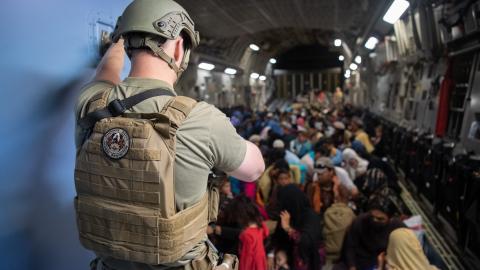The new Republican-controlled House of Representatives has begun its investigation into America’s disastrous withdrawal from Afghanistan in August 2021. The chairman of the House Foreign Affairs Committee, Mike McCaul, best summed up the logic behind the investigation: “What happened in Afghanistan was a systemic breakdown of the federal government at every level — and a stunning failure of leadership by the Biden administration,” he said. He is correct.
It was President Joe Biden who made the ultimate decision to bring America’s military presence in Afghanistan to the shambolic end witnessed by the world in 2021. It is true that his predecessor, DonaldTrump, began the process with his questionable and highly dubious deal with the Taliban in 2020. But Biden could have changed the course he inherited. After all, he had no problem changing or scrapping hundreds of other Trump administration policies — so why not the Afghan withdrawal?
While it may be politically expedient for Republicans to narrowly focus the investigation on the final months of America’s presence in Afghanistan, this does not address the bigger picture. Whether Republican or Democrat, military or civilian, there is plenty of blame to go around when it comes to the conduct of America's two-decade war in Afghanistan. All the lessons need to be learned.
In many ways, the US invasion of Afghanistan was a victim of its own success. In the early days after the Sept. 11 attacks, the US mission in Afghanistan had two main goals. The first was punishing the Taliban for their failure to hand over Osama bin Laden. The second was to deny access to Afghanistan for terrorist groups so they could no longer use it as a base to plan, launch, and train for transnational attacks. Both objectives were accomplished relatively quickly. In fact, when the Taliban were kicked out of Afghanistan in December 2001, the ruins of the World Trade Center in lower Manhattan were still burning.
With these two strategic goals accomplished by early 2002, the US military mission in Afghanistan transformed into an ill-fated nation building exercise. By the time Trump entered the political scene in 2016, the US had already been in Afghanistan for 15 years. However, at this time the US had a tiny proportion of the forces in Afghanistan that it once had, and at a fraction of the cost; the Afghans were leading combat operations instead of the Americans, few American casualties were suffered, and the war was rarely mentioned in US media. Nobody ever claimed this smaller force would lead to the defeat of the Taliban, but it was enough to ensure that the militants did not take over the country and turn Afghanistan into a terrorist haven once again.
Even so, Trump’s populist slogan of “ending forever wars” was politically effective; so much so that it was continued by Biden, who in recent years had also been very critical of America’s continued presence in Afghanistan.
While it is right for the investigation to get to the bottom of the decision-making processes that led to the defeat and withdrawal from Afghanistan, members of Congress shouldn’t fool themselves into thinking that the problems began only then. It would benefit the US foreign policy and national security community if Congress were to set up an independent and national commission to analyze what lessons can be learned from the duration of the whole conflict, starting in October 2001.
In addition to investigating the withdrawal from Kabul, there is still a lot of work for Congress to do regarding Afghanistan. For example, tens of thousands of Afghans have been brought out of the country but are now stuck in an immigration legal limbo in the US. Congress has yet to pass the appropriate legislation needed to give these Afghans a pathway to permanent legal residency in the US. In fact, only about 5,000 of almost 80,000 Afghans resettled in the US have secured permanent legal status. Unless Congress acts soon, the remaining Afghans will no longer be able to legally work or live in the US. Domestic politics in the US regarding the issue of immigration make it politically challenging to address the Afghan issue in a meaningful way. This is still no excuse. Failure to act would be morally negligent and a dereliction of duty.
Also, there are still thousands of Afghans, in both the military and civilian sectors, who helped the international coalition for years but were left behind during the chaotic withdrawal from Kabul. Even though the Taliban promised there would be no retribution against those who worked with the international coalition, not a week goes by without stories of former Afghan soldiers, police, or government workers being summarily executed by the Taliban. The US needs to work with regional partners, especially in the Gulf, to redouble efforts to help find a path out of Afghanistan for those who helped the international coalition but were left behind.
The US withdrawal from Afghanistan was a national disgrace. American prestige and honor around the world has been severely tarnished. The US has a long way to go to repair the damage that has been done, but a good place to start would be to do a better job looking after those Afghans who helped. So while Congress conducts its investigation, it not must ignore these other pressing, albeit politically difficult, issues.



















